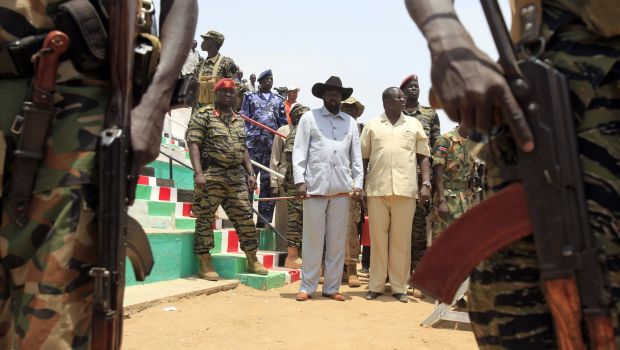The South Sudan People’s Liberation Movement (SPLM), which has governed South Sudan since its premature secession from Sudan in 2011, is in serious crisis. Earlier this week, President Salva Kiir declared that an armed “coup attempt” by his sacked vice president, Riek Machar, had been foiled. Unless stopped, the violent power grab has the potential to exacerbate South Sudan’s own ethnic fault lines, setting it on the course to becoming the world’s first state to fail almost as soon as it was created.
The SPLM’s monopoly on political legitimacy, which arose from its revolutionary struggle during decades of civil war with Sudan, has positioned it above other factions in the country. Backed with the inherited moral authority of its late leader, Dr. John Garang, SPLM’s prestigious status enabled it at first to accommodate an array of vested interests and establish an economic order in a climate of national support and jubilation.
Less than two years on, national patience has worn thin. Growing apathy and discontent with the scope and pace of economic change is on the rise. Poverty levels are alarming, and economic inequality is further fueled by high unemployment, state incompetence and unbridled corruption. Government efforts to implement austerity measures and control spending taken since April 2012, coupled with slow progress in expanding housing, electricity and social services, have exacerbated these tensions.
The SPLM government has been struggling to cope, but there is growing concern about its capacity to govern. South Sudan’s most pressing development measures are being watered down by mismanagement and weak governance. The much-needed expansion of infrastructure is being hindered by political favoritism and rampant corruption. The oil industry is notoriously opaque, and there are serious concerns about where the oil money goes. An unsolicited 4.5 billion US dollar debt from an unknown source that was spent in an undisclosed way is adding to the recent controversy. President Kiir himself has called on his government officials to return stolen cash in the past. Bluntly, the former SPLM secretary-general, Pagan Amum, admitted that whatever the government has achieved is a “drop in the ocean of Southern Sudan’s needs,’ and that corruption remains a real obstacle.
President Kiir’s monopoly on power has allowed the trust deficit to grow over the years. Deep-seated divisions within its leadership, exacerbated by Kiir’s authoritarian tendencies and the dysfunctional organizational structure, have been destabilizing. Under the pretext of responding to popular frustrations, President Kiir removed his main political rivals, Vice-President Machar and SPLM Secretary-General Amum, as well as his Cabinet, many of whose members had been on the receiving end of corruption accusations. But the political crisis extends beyond that. President Kiir threatened to dissolve the national parliament unless it supported his nomination of James Wani Igga as the new vice president. Lawmakers unanimously endorsed the nomination, mostly to avoid dividing the country further. Upon Machar’s announcement that he was interested in running for the presidency in next year’s elections, Kiir announced that the elections might be delayed due to a lack of funds.
Beyond the divided SPLM, ethnic passions are peaking across South Sudan. Violent tribal clashes are on the rise as more disempowered citizens demand noticeable economic improvements and political representation. While the crisis is not ethnic in itself, its ripple effects are stirring ethnic tensions given that Kiir, a Dinka, and Macher, a Nuer, belong to two different ethnic groups that have a history of embitterment and rivalry. Without an inclusive conciliatory tone and curbs to the reported brutality of the SPLA in crushing dissent, Kiir will further alienate tribal leaders and rebel commanders, as well as ordinary people from the areas where inter- and intra-tribal fighting is most common.
This is important. The behavior of security forces since South Sudan’s independence, including the reported targeted ethnic killings, is fueling the rebellion and a general sense of resentment of the government. To no-one’s surprise, long-term transition in South Sudan will depend on the capacity of its political (dis)order to rein in and reform the security sectors, including the SPLA, internal security apparatuses and guerilla forces. Those are the very groups that have grown too powerful, too brutal and too autonomous.
The SPLM’s future as a political force rests squarely on how Kiir contains the current political crisis. With the rise of tribalism, short-term military victory will hardly translate into long-term tangible political gains. The SPLM’s own legitimacy has been tainted as its leaders drive the country through the motions of civil unrest in their quest for power. If the SPLM manages to exist from the current crisis, its overwhelming priority will be to maintain political dominance in the 2014 elections. However, having gained the reputation of a corruption-plagued government that divides rather than unites, it needs to replenish its political capital. The SPLM may be tempted to focus on short-term measures and patronage to regain pubic confidence and garner votes, which will risk dragging the country once more into a political crisis. Undeniably, it will be difficult to prevent pockets of civil unrest and violence from shaking investor confidence.
The way out of the crisis is unclear. The longer the insurgency lasts, the wider the criminal dimension and prospect of radicalization becomes. Kiir and Machar disagree over how to proceed. South Sudan’s neighbors are even more divided on what to do, and the armed factions within South Sudan have yet more divergent aims. As South Sudan disintegrates, there is little that the foreign or regional community alone can or will do to end the power grab. South Sudan is in dire need of responsible leadership—otherwise, it could plunge into a full-blown civil war, and perhaps even spark a regional crisis.
